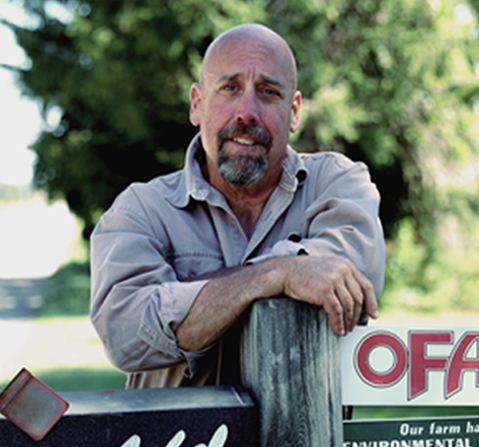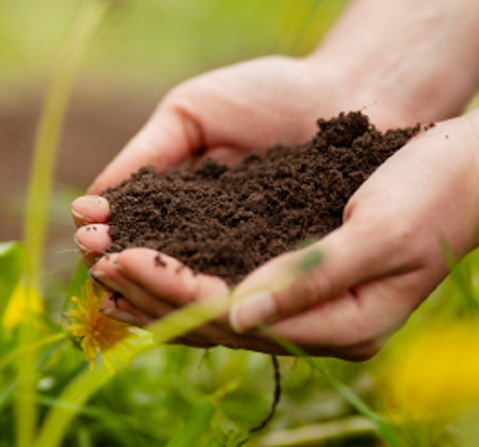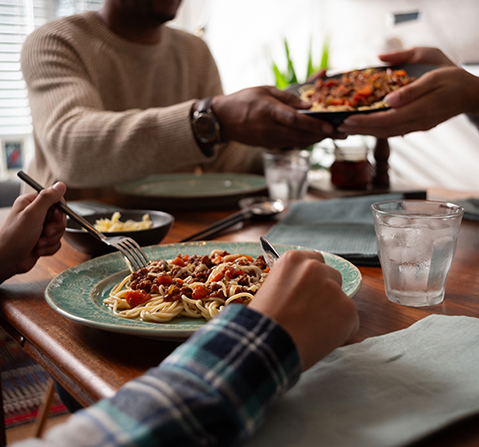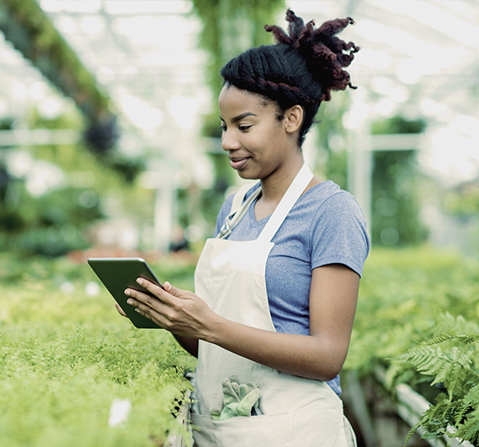Egg producer, Ferme St-Ours, Quebec.
Discover why Marie-Pier works for a sustainable future
Transcript
[Laughing] How many eggs will a hen lay per day? A hen will lay an average of one egg every 25 hours, so about one egg per day. It started out as a dairy farm. Then, in '93, a decision was made to move towards laying hens. What I like most about my work is the diversity. Every day is different. We work with real people. We keep in touch with nature, too. We have contact with the chickens and the fields. That is what keeps us grounded. In terms of sustainable practices, we have an organic mill. The mill allows us to give our breeding pullets and free-range hens 100% organic feed. For me, it's agriculture that makes sense, which is done in such a way that the animals, our environment and the people we work with are respected. To be the most productive, but above all to ensure the continuity of the farm for other generations. My grandfather often said that the land belongs to our children and is on loan to us. We have to take care of it today so that tomorrow we can have agriculture in Canada as well. [Laughing] How many eggs will a hen lay per day? A hen will lay an average of one egg every 25 hours, so about one egg per day. It started out as a dairy farm. Then, in '93, a decision was made to move towards laying hens. What I like most about my work is the diversity. Every day is different. We work with real people. We keep in touch with nature, too. We have contact with the chickens and the fields. That is what keeps us grounded. In terms of sustainable practices, we have an organic mill. The mill allows us to give our breeding pullets and free-range hens 100% organic feed. For me, it's agriculture that makes sense, which is done in such a way that the animals, our environment and the people we work with are respected. To be the most productive, but above all to ensure the continuity of the farm for other generations. My grandfather often said that the land belongs to our children and is on loan to us. We have to take care of it today so that tomorrow we can have agriculture in Canada as well.
[Upbeat electronic music starts.]
[Video collage that includes a picture of a farmhouse, close-up view of multiple chickens, a sunflower field, a bird's-eye view of a building on a farm, three people walking together down a road, and a crop field with multiple barns behind.]
Text on screen: Meet the people behind your food
[Laughs.]
[Marie-Pier Lefebvre standing outside with a blurred-out view of the farm behind her.]
Text on screen: Marie-Pier Lefebvre – Egg Producer, St-Ours, Quebec
Marie-Pier Lefebvre: How many eggs will a hen lay per day?
A hen will lay an average of one egg every 25 hours, so about one egg per day.
Text on screen: Type of farm?
[Aerial view of the main building on the farm.]
Marie-Pier Lefebvre: It started out as a dairy farm.
[Aerial view of a piece of land on the farm which includes a large barn and field crops.]
[A close-up view of multiple chickens.]
Then, in '93, a decision was made to move towards laying hens.
[A close-up view of multiple eggs. Farmer's hands moving the eggs on conveyer belt. Eggs being placed in egg cartons by a machine.]
Text on screen: What do you like about your work?
[Marie-Pier Lefebvre standing outside with a blurred-out view of the farm behind her.]
Marie-Pier Lefebvre: What I like most about my work is the diversity.
[Birds-eye view of the main building on the farm.]
Every day is different. We work with real people.
[Marie-Pier Lefebvre sharing a conversation with someone outside, with a sunflower field behind them.]
We keep in touch with nature too.
[A black pickup truck driving down a small dirt road within the property.]
We have contact with the chickens and the fields.
[A close-up view of somebody holding a chicken close to their chest.]
[Marie-Pier Lefebvre pulling and handling crops on the outer edge of the sunflower field.]
That is what keeps us grounded.
[Footage of a man walking in the opposite direction through a pasture.]
Text on screen: An example of a sustainable practice?
[Aerial view of two barns surrounded by many silos off a dirt road on the farm.]
In terms of sustainable practices, we have an organic mill.
[A close-up view of someone's hand pressing buttons on a wall-mounted control panel.]
The mill allows us to give our free-range pullets and hens 100% organic feed.
[A close-up view of someone's hand scooping grains out of a metal bin. Footage of five chickens standing around their chicken coop door and walking in the direction of the camera within a barn.]
Text on screen: What is sustainable agriculture?
[Marie-Pier Lefebvre standing outside with the farm behind her.]
For me, it's agriculture that makes sense, which is done in such a way…
[A close-up view of a person holding a chicken in their arms.]
...that the animals, our environment and the people we work with are respected.
[Footage of a man walking towards the camera, with a transport truck parked on his left. Dozens of eggs moving down a conveyor belt.]
To be the most productive, but above all to ensure the continuity of the farm for other generations.
[Footage of a man sitting at a desk while using a calculator with papers in front of him.]
Text on screen: Words of wisdom?
[Aerial view of large crop field and a tree-line in the distance.]
My grandfather often said that the land belongs to our children and is on loan to us. We have to take care of it today so that tomorrow we can have agriculture in Canada as well.
[A group of three walking together along a dirt road with a crop field to their right and their backs towards the camera. A close-up view of a sunflower field. Aerial view of the farm with barns and crop fields.]
Text on screen: Canadian farmers and agricultural businesses work to feed you and future generations. Discover how they are growing a better future. Canada.ca/Taste-the-Commitment
[Marie-Pier Lefebvre smiling and proudly holding up an egg towards the camera.]
[Music ends.]
Text on screen: Agriculture and Agri-Food Canada Agriculture et Agroalimentaire Canada
[Government of Canada logo.]
[End.]
Learn how Marie-Pier puts sustainability into practice
Transcript
Consumers are increasingly aware of what is happening in production and that's a good thing. It leads them to ask questions, which is something we encourage. Responsible and respectful agriculture. It is agriculture that is optimal and sustainable for future generations. On our farm we have free range hen coops and organic hen coops. We have an organic mill. The mill allows us to feed our breeding pullets and organic hens with 100% organic feed. In our sustainable environmental practices, we always select technologies that make it possible to be the most efficient, as well as to have the smallest possible environmental footprint. For example, we opt for heat exchangers that reduce the use of propane or natural gas. And then, of course, we choose systems that help us manage water consumption and feed consumption in the most optimal manner. The manure produced by the layer hens and breeding pullets will definitely be used as fertilizer for vegetables and field crops. For egg production, for example, we face a challenge these days, mainly in terms of biosecurity with viruses and avian flu. In addition, viruses are becoming more and more resistant and new viruses are appearing. We must also think about how we build and renovate our coops in order to minimize our biosecurity risks. The whole industry must feel concerned in this case, including those who come to get the eggs and those who deliver the chicks. Everyone needs to be aware. In terms of field crop production there are environmental aspects. You can be sure that the temperature changes and other effects of climate change we are seeing these days affect production a lot. You have to know how to adapt and how to react. All farmers are aware of the importance of following good practices. It's important for us that our hens are healthy. It's also important that the land is in good condition. Not only because of our values, but also, to have good production. You have to take care of them.
[A montage includes an aerial view of the St-Ours farm, three people walk together down a road and a crop field with three large poultry barns behind.]
Consumers are increasingly aware of what is happening in production…
[An aerial view of the poultry barns beside a complex network of grain bins.]
…and that's a good thing.
[Marie-Pier Lefebvre talks to the camera.]
Text on screen: Marie-Pier Lefebvre – Egg producer, St-Ours, Quebec
It leads them to ask questions, which is something we encourage.
[An animated fork and shovel appear on the screen, on either side of the title with blurred cartons full of eggs in the background.]
Text on screen: Sustainable Agriculture in Action
[A close-up view of hens.]
Text on screen: What is sustainable agriculture?
[Marie-Pier, outside, talks to the camera.]
Responsible and respectful agriculture.
[An aerial view of the farm with fields in the distance. Marie-Pier talks with her brother while sitting in the back of a parked pickup truck beside a sunflower field.]
It is agriculture that is optimal and sustainable for future generations.
[Marie-Pier talks with her cousin in front of a sunflower field.]
Text on screen: What do you do on the farm?
[A montage includes a close-up view of the Ferme des Patriotes farm sign with a corn field in the background, an aerial view of the farm and a close-up of hens standing in and outside of their coop.]
On our farm we have free-range hen coops and organic hen coops.
[An aerial view of a building with several networked grain bins.]
We have an organic mill.
[A close-up view of a hand scooping feed out of a metal bin.]
The mill allows us to feed our breeding pullets and organic hens with 100% organic feed.
[A close-up view of hens, outside of their coop.]
Text on screen: What are your sustainable practices?
[An aerial view of a large crop field.]
In our sustainable environmental practices, we always select technologies that make it possible…
[A man presses buttons on a wall-mounted control panel.]
…to be the most efficient, as well as to have the smallest possible…
[A man sits at a desk; he uses a calculator and checks papers in front of him.]
…environmental footprint.
[He hangs a clipboard on the wall.]
For example, we opt for heat exchangers…
[An aerial view of a building and equipment on the farm.]
…that reduce the use of propane or natural gas.
[An aerial view of two large propane tanks.]
[A close-up view of a man's hand pressing buttons on a wall-mounted control panel.]
And then, of course, we choose systems that help us manage water consumption and feed consumption…
[He reads a sticky note while using a wall mounted control panel with a screen showing a model design of the farm and silos.]
…in the most optimal manner.
[Hens walk freely in a barn.]
The manure produced by the layer hens and breeding pullets will definitely be used…
[A close-up view of a sunflower field.]
… as fertilizers for vegetables and field crops.
Text on screen: What are your challenges?
For egg production, for example…
[Brown eggs move along conveyors.]
…we face a challenge these days, mainly in terms of biosecurity with viruses and avian flu.
[A close-up view of eggs in containers in rows.]
In addition, viruses are becoming more…
[A close-up view of a biosecurity sign that reads, do not enter without authorization.]
…and more resistant and new viruses are appearing.
[A montage that includes an aerial view of the farm and the buildings with a delivery truck parked at the loading dock, a close-up view of the hens moving freely in the coop as a worker collect eggs.]
We must also think about how we build and renovate our coops in order to minimize our biosecurity risks.
The whole industry…
[A montage includes hands collecting eggs from a conveyor and a close-up view of a machine placing eggs into trays.]
…must feel concerned in this case, including those who come to get the eggs and those who deliver the chicks.
[A montage includes eggs in trays going through a machine that stacks them.]
Everyone needs to be aware.
A worker pushes a cart full of trays of eggs.]
In terms of field crop production there are environmental aspects.
[An aerial view of the farm.]
You can be sure that the temperature changes and other effects of climate change…
[Aerial views of crop fields.]
…we are seeing these days affect production a lot.
You have to know how to adapt…
[Marie-Pier and her brother and cousin walk together down a gravel road.]
…and how to react.
Text on screen: What should we know about farmers?
All farmers are aware of the importance of following good practices.
[Marie-Pier holds up an egg to the camera and smiles.]
It's important for us that our hens are healthy.
[A close-up view of somebody holding a hen close to their chest.]
It's also important that the land is in good condition.
[An aerial view of the farm.]
Not only because of our values, but also, to have good production.
You have to take care of them.
[A close-up aerial view of a sunflower field.]
[An aerial view of the farm.]
[Upbeat music ends.]
Text on screen: Canadian farmers and agricultural businesses work to feed you and future generations. Discover how they are growing a better future. Canada.ca/Taste-the-Commitment
Text on screen: Agriculture and Agri-Food Canada – Agriculture et Agroalimentaire Canada
[Government of Canada wordmark.]
[End.]







